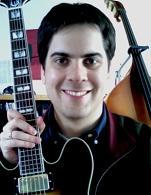 Chris Beyt is a guitarist and educator with a bright future
ahead of him. Having already completed two music degrees at some of the
countries top schools, he is currently a DMA candidate at the University of Illinois.
Aside from his busy course schedule, Chris is also a busy performer and has
recently accepted his first college teaching position.
Â
Chris Beyt is a guitarist and educator with a bright future
ahead of him. Having already completed two music degrees at some of the
countries top schools, he is currently a DMA candidate at the University of Illinois.
Aside from his busy course schedule, Chris is also a busy performer and has
recently accepted his first college teaching position.
Â
Chris sat down with us last week to talk about how his own education has effected his teaching approach, and how he is dealing with the trials and tribulations of his first college teaching position.
MW: How did you get your start as a guitar teacher?
CB: I had started my bachelor’s degree in jazz, and teaching became an obvious next step towards making a career, or even just a little money as a musician. A parent of a student at the school where my wife (then girlfriend) taught was organizing music lessons for students, and they needed a guitar teacher. It was as simple as that. Later on I put up fliers for lessons, but that only lead to one or two students, and one crazy guy who called at 3 am.Â
MW: Did any of your teachers have an influence on your private teaching approach?
CB: They all have to some degree. Since I’m mainly teaching grade school and high school students right now, I’m drawing primarily from my first guitar teacher back when I was in high school. He was a relaxed and friendly guy who made learning music fun rather than work, and I try to do the same for my students.
MW: As someone who draws from many influences in their playing how do you encourage students to explore different genres and styles of music?
CB: First of all I’ll play music during lessons and talk about it, especially for the students in my college guitar class for non-majors. I’ll try to put different musical styles in a historical context, or make comparisons to music they are more familiar with. Sometimes it’s as simple as giving listening recommendations.
I also encourage them to form opinions, good or bad, about the music and have them explore their own preferences. Talking about stylistic traits, or what a single instrument is doing, can make their ears bigger. This will hopefully help them to further appreciate music that is either new to them, or something they’ve listened to for years but are now hearing in a new way.
MW: You are currently working on your DMA in jazz performance. Have your goals as a teacher and performer changed as you have gone further with your musical education?
CB: Yes. Initially, like many, I wanted to primarily perform. But I’ve come to learn the rewards and quality of life of teaching, and I’d like it to be the bulk, or at least a large part of my own career.  Teaching is also more conducive to having a family, which my wife and I will be doing in a few years. However, I will always want to play.
MW: You are such an experienced and accomplished performer as well as an educator. How has your teaching experience influenced your performing and vice-versa?
CB: As I gain more and more experience as a performer, it gives me more to draw upon as an educator. I’m able to speak more from experience, and less from reciting whatever their Guitar for Beginners book says. Experience of playing in different settings has helped me be a more versatile teacher. For example, playing church gigs has helped me show some students more accurately what to expect and what they need to do to play in their churches.Â
I can’t imagine how teaching has affected my performing. I don’t doubt it has; I’m just not sure how.
MW: What advice do you have for people who are just starting to teach guitar?
CB: It can often be hard to imagine how someone could not understand the most basic things in music, such as notes higher on the staff are higher in pitch, that a chord is more than one note, or that there’s no H note. Don’t assume new students know these things.Â
Ask them right off the bat what they know, that way the first lesson won’t be too confusing or patronizing. Furthermore, ask them and let them know you’re interested in what they want to be able to do on the guitar. Give them an idea of how the first few weeks or months of lessons will go, and explain the steps to get them to their goals. Tell them what they’ll get out of learning things that might not seem that interesting, like being able to play a stupid little melody on the first string. But above all else, make it fun.
MW: What advice do you have for students when they are looking for a private teacher?
CB: Find someone who explains things clearly; that will be a pretty good sign they know what they’re talking about. Make sure they’ll help you do what you want to do, and make sure that studying with them is enjoyable. I find that, as a student, the best teachers make me want to start practicing right away.
MW: Thanks for taking the time to talk to us today.
CB: My pleasure!
